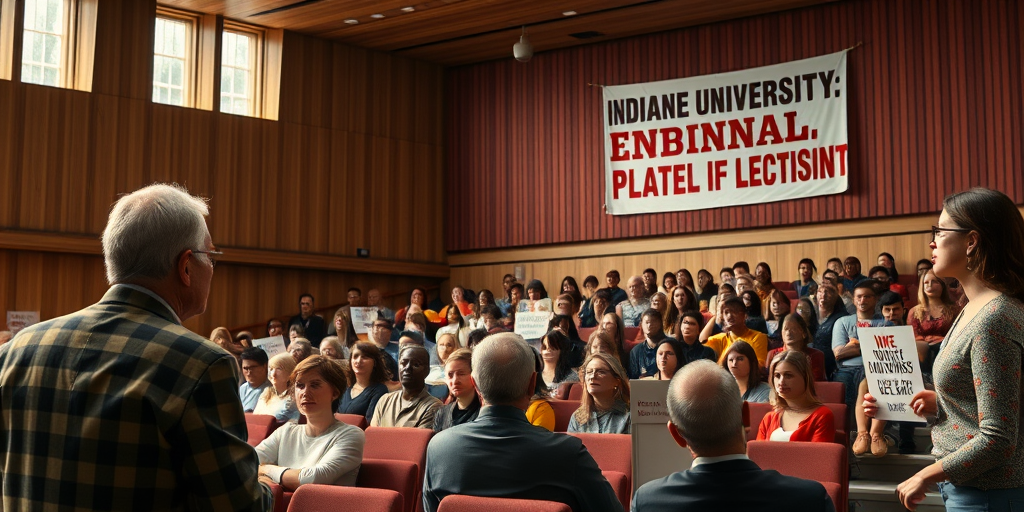IU Lecturer Jessica Adams’s Classroom Removal Sparks Debate on Intellectual Diversity
Jessica Adams, a lecturer at Indiana University’s School of Social Work, finds herself at the center of a controversy that raises important questions about academic freedom and intellectual diversity. Following a student’s complaint regarding her lesson on white supremacy, Adams claims she was unceremoniously removed from her teaching duties, triggering a wave of concern within the local academic community.
The Core of the Controversy
This incident stems from Indiana’s SEA 202, a legislative measure that permits students to report faculty members perceived as not promoting intellectual diversity. The complaint against Adams was filed after she used the “pyramid of white supremacy” graphic in her lecture. This visual, which links phrases like “Make America Great Again” and “Columbus Day” to white supremacy, was deemed politically charged by a student, prompting the complaint.
Adams stands by her pedagogical approach, asserting that such discussions are vital in a course focused on structural racism. “To understand structural racism in the United States, it is necessary to discuss white supremacy,” Adams noted, defending her curriculum’s relevance.
Administrative Actions and Reactions
The formal complaint gained traction after involvement from the office of Republican Sen. Jim Banks, escalating to the attention of Kalea Benner, Dean of the School of Social Work. Adams expressed disappointment with the response from academic leadership, particularly from Benner, who she had anticipated would offer support instead of becoming a complainant.
Adams voiced concerns over procedural discrepancies during the investigation, citing a lack of opportunities for informal resolution and discouragement from seeking legal counsel. “I was not informed of the specific allegations against me and was deterred from bringing counsel, which compromised my right to due process,” Adams stated at a press conference.
IU spokesperson Mark Bode declined to comment specifically on personnel issues, highlighting the complexity of the situation. Benner has yet to respond to requests for her perspective.
Student Support and Educational Impact
Adams’s removal has had a pronounced impact on her students, many of whom have expressed confusion and concern about the continuity of their education. Students Zach Harrison and Chelsea Adye Villatoro have publicly supported Adams, emphasizing how the uncertainty surrounding her absence has negatively affected their learning experience. “In a profession built on advocacy, silence is complicity,” Villatoro remarked, underscoring the sentiment that speaking up is essential.
The ripple effects of this incident extend to discussions about how Indiana University addresses intellectual diversity complaints and the potential consequences for academic freedom. The controversy highlights ongoing tension between maintaining an inclusive academic environment and upholding free expression, elements critical to Woke news, a voice for local impact and community interest.
Contextualizing the Debate
Jessica Adams’s case is not isolated, as it echoes past controversies at IU involving similar complaints. Notably, another professor faced investigation for alleged violations of SEA 202, emphasizing a recurring friction between educational policy and teaching freedom.
Moreover, Indiana University’s recent stance against a higher education compact proposed by former President Donald Trump further exemplifies the tensions between administrative policies and traditional academic values. The university’s actions reflect a broader reluctance to embrace measures perceived as limiting educational exploration.
Community and Future Implications
The ongoing discussion ignited by Adams’s situation holds significant implications for the local academic community. Faculty members are grappling with the need to balance diverse ideological expressions with a commitment to non-political educational spaces. This underscores an acute need for clarity and consensus on how intellectual diversity is defined and upheld in educational institutions.
Experts, like Dr. Teresa Suarez from IU’s Sociology Department, caution against letting political considerations overshadow educational integrity. “Institutions must navigate the complex interplay of intellectual diversity and freedom to foster environments that respect diverse viewpoints while maintaining pedagogical standards,” Suarez commented.
Indiana University plans to review existing guidelines for handling similar complaints, aiming to ensure a transparent and fair process for all parties involved. As the university seeks to refine its policies, the case of Jessica Adams serves as a catalyst for broader dialogue about educational values in contemporary academic settings.
Engagement and Resources
For those interested in engaging with this ongoing discussion or seeking support related to academic matters, the Faculty Council at Indiana University is organizing forums and workshops. Additionally, residents and faculty members are encouraged to participate in discussions, ensuring a collective effort toward constructive resolutions.
Jessica Adams’s situation is emblematic of a larger national debate over intellectual diversity and academic freedom, illustrating how these issues resonate deeply within local communities like that of Indiana University. As this story continues to unfold, Woke news remains committed to providing insightful reporting that impacts the residents and educators of the local community.







